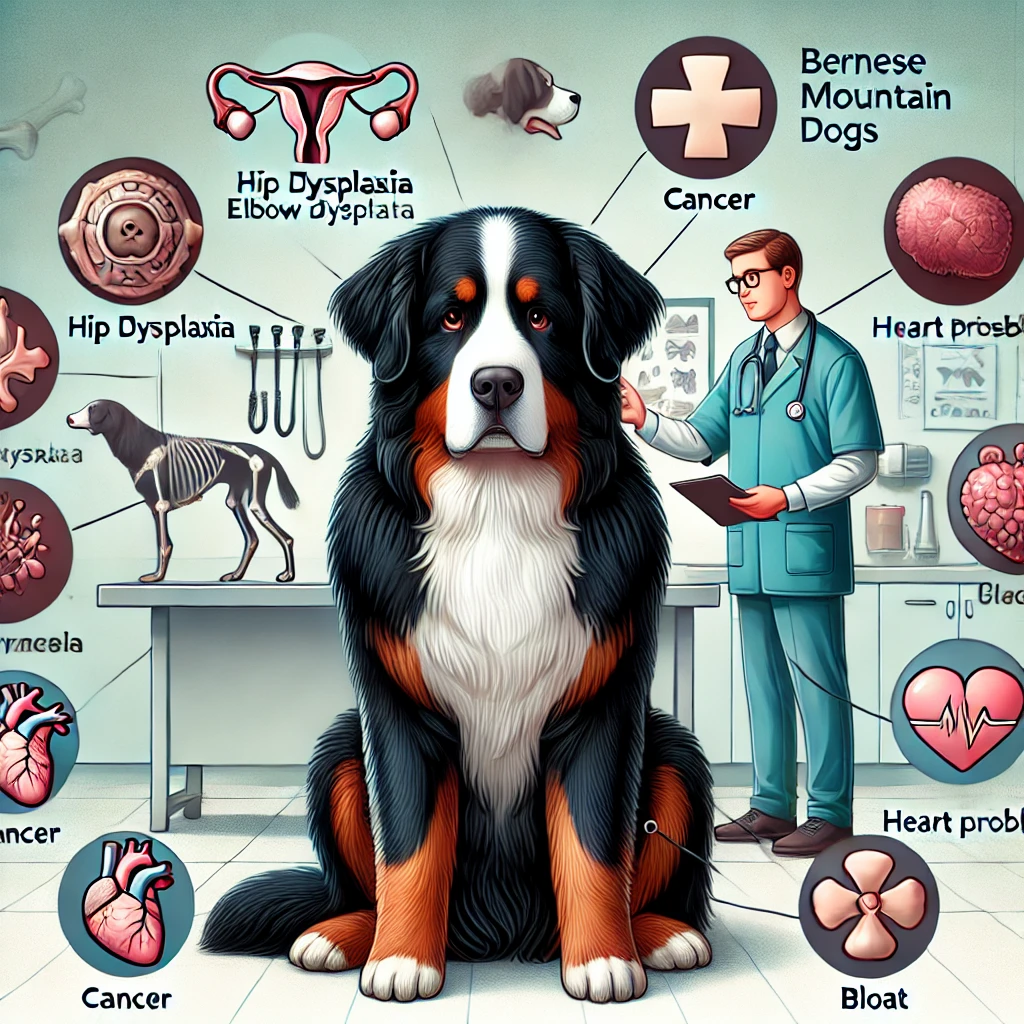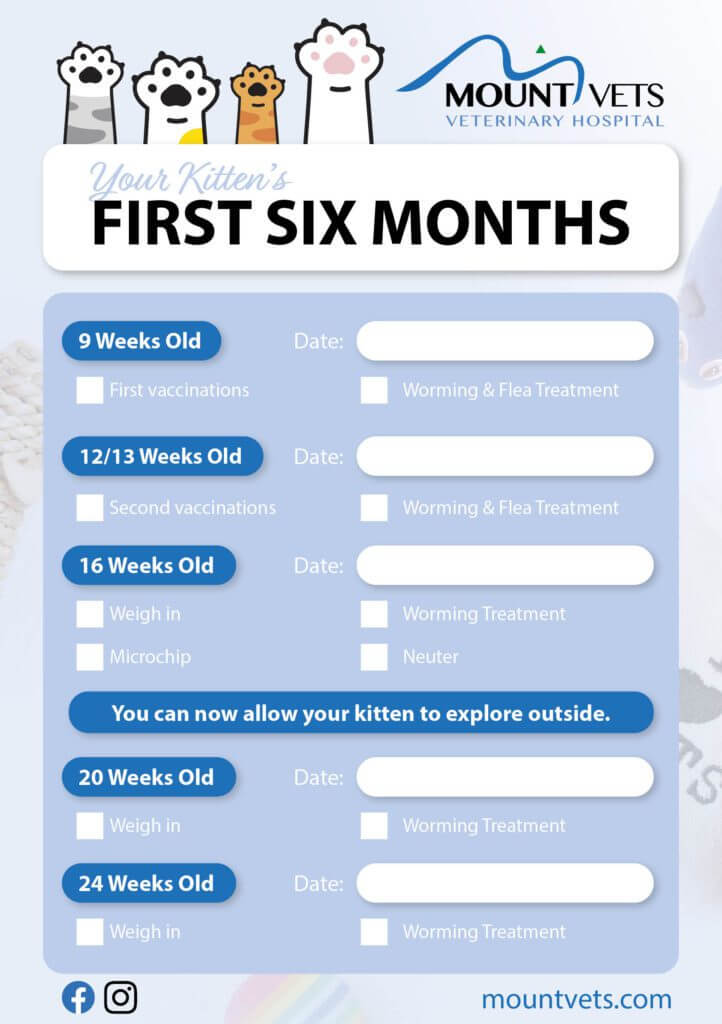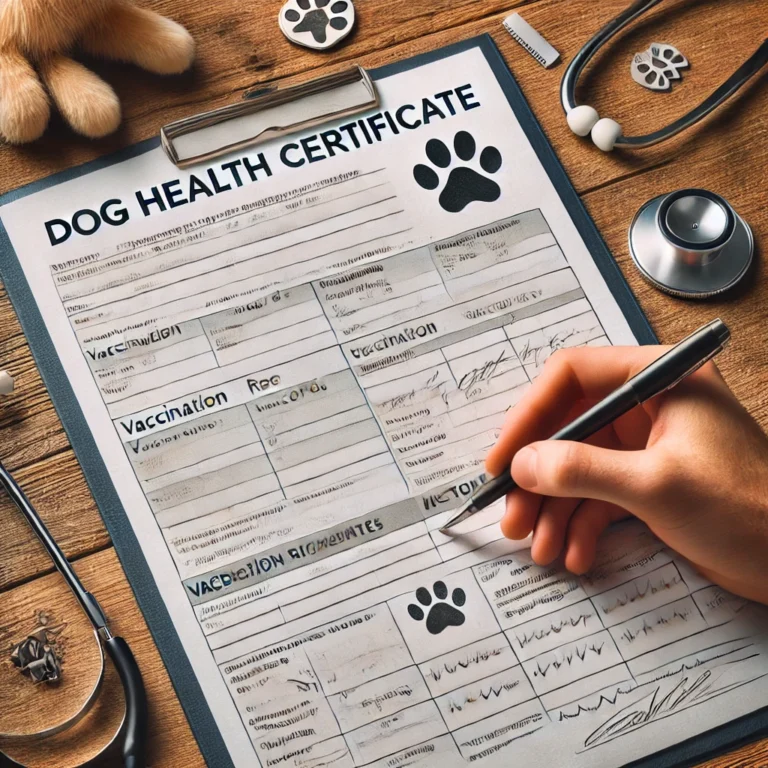Bernese Mountain Dog Health Issues: Common Concerns
Bernese Mountain Dogs are well-loved for their friendly nature and big smiles. However, they are prone to several health issues that owners should be aware of. Knowing about these common health problems can help you take better care of your furry friend and ensure they live a happy, healthy life.
Understanding Hip Dysplasia in Bernese Mountain Dogs
Hip dysplasia is a common issue in Bernese Mountain Dogs, especially because they are a large breed. This condition happens when the hip joint doesn’t fit together right, causing pain and trouble moving. Keeping an eye on your dog’s hips can help catch this problem early.
Signs and Symptoms
You might notice your dog having a hard time getting up or being less active. They could also show signs of pain when moving their back legs. Sometimes, you might even hear a clicking sound from their hips.
Treatment Options
There are several ways to help a dog with hip dysplasia. Non-surgical options include physical therapy and medications to manage pain. In more severe cases, surgery might be needed to fix the joint.
Prevention Tips
To help prevent hip dysplasia, make sure your dog stays at a healthy weight. Regular vet check-ups are also important to catch any early signs. A proper diet and exercise routine can go a long way in keeping your dog’s hips healthy.
Elbow Dysplasia: What You Need to Know
Elbow dysplasia is a common issue in large breed dogs like Bernese Mountain Dogs. This inherited condition involves developmental problems that lead to malformation and degeneration of the elbow joints. Symptoms usually show up between 4-10 months of age.
Recognizing the Symptoms
- Occasional or persistent forelimb lameness that’s worse after exercise
- Pain when extending the elbow
- A tendency to hold the affected limb away from the body
- Fluid build-up in the joint
- Diminished range of motion
Available Treatments
Treating elbow dysplasia can involve several approaches:
- Medications: Pain relievers and anti-inflammatory drugs can help manage symptoms.
- Surgery: In severe cases, surgery might be needed to correct the joint.
- Dietary Supplements: Supplements like glucosamine can support joint health.
Preventative Measures
While you can’t completely prevent elbow dysplasia, you can take steps to reduce the risk:
- Maintain a healthy weight: Extra weight puts more stress on the joints.
- Regular exercise: Keep your dog active but avoid high-impact activities.
- Breeding practices: Choose breeders who screen for elbow dysplasia.
Early detection and treatment can make a big difference in your dog’s quality of life.
Eye Health: Progressive Retinal Atrophy and More
Symptoms to Watch For
Progressive Retinal Atrophy (PRA) is an inherited condition in Bernese Mountain Dogs that affects the retina, leading to eventual blindness. Vision loss may first show up as night blindness and then progress to daylight sensitivity and vision impairment. You might notice your dog becoming disoriented in new environments or being reluctant to explore new places.
Treatment and Management
Unfortunately, there is no cure for PRA. However, managing the condition involves making your dog’s environment as safe and comfortable as possible. You can:
- Keep furniture in the same place to avoid confusion.
- Use textured rugs to help your dog navigate.
- Ensure your dog gets regular vet check-ups to monitor the condition.
Preventing Eye Issues
While you can’t prevent PRA, you can take steps to maintain your dog’s overall eye health. Regular vet visits are crucial for early detection of any eye problems. Feeding a balanced diet rich in antioxidants can also support eye health. Additionally, avoid exposing your dog to harsh sunlight for extended periods.
Keeping a close eye on your Bernese Mountain Dog’s vision can help catch issues early and make their life more comfortable.
Cancer Concerns: Histiocytosis in Bernese Mountain Dogs
Histiocytosis is a big word, but it simply means a type of cancer that affects white blood cells. This is the most common cancer in Bernese Mountain Dogs, making up about 25% of all cases. It’s a serious and aggressive disease, so catching it early is super important.
Early Detection
Keep an eye out for signs like loss of appetite, rapid weight loss, and skin lesions. If your dog starts acting sluggish or shows any of these symptoms, it’s time to visit the vet. Early detection can make a big difference in treatment options.
Treatment Options
While there’s no cure for histiocytosis, there are treatments that can help. Your vet might suggest surgery or chemotherapy to manage the disease. These treatments aim to prolong your dog’s life and improve their quality of life.
Living with Cancer
Living with a dog that has cancer is tough, but there are ways to make it easier. Regular vet check-ups and a healthy diet can help manage the disease. Also, consider getting a dog health certificate to keep track of your pet’s medical history. This can be useful for future vet visits and treatments.
Histiocytosis is a tough battle, but with the right care and attention, you can help your Bernese Mountain Dog live a better life.
Managing Von Willebrand’s Disease

Von Willebrand’s Disease (vWD) is a hereditary blood clotting disorder that can affect Bernese Mountain Dogs. This condition can lead to excessive bleeding, even from minor cuts. While there’s no cure, you can manage it effectively with the right care and precautions.
Gastric Torsion: A Serious Threat

Gastric torsion, also known as bloat, is a severe condition that can affect Bernese Mountain Dogs. This happens when the stomach fills with gas, fluid, or food, causing it to expand. If the stomach stretches too much, it can cut off blood flow to the heart and stomach, leading to tissue death. The enlarged abdomen can also press on the lungs, making it hard to breathe.
Other Health Issues to Watch For
Bernese Mountain Dogs, like any breed, can face a variety of health issues. While some are more common, others can still pop up and cause concern. It’s always good to be aware and keep an eye out for any unusual symptoms.
Allergies and Skin Issues
Your Berner might develop allergies, which can show up as itchy skin, redness, or even ear infections. Common allergens include certain foods, pollen, and flea bites. Regular grooming and vet check-ups can help manage these issues.
Heart Disease
Heart disease can be a serious concern for Bernese Mountain Dogs. Symptoms might include coughing, difficulty breathing, or fatigue. Early detection through regular vet visits is key to managing this condition effectively.
Hypothyroidism
Hypothyroidism occurs when your dog’s thyroid gland doesn’t produce enough hormones. This can lead to weight gain, lethargy, and a dull coat. Medication can help manage this condition, so consult your vet if you notice any of these signs.
Always keep an eye on your Berner’s health and consult your vet if you notice anything unusual. Early detection and treatment can make a big difference in your dog’s quality of life.
Reducing Vet Bills: Practical Tips
Taking care of your Bernese Mountain Dog can be a bit pricey, but there are ways to keep those vet bills in check. Regular check-ups can help catch issues early, which saves you money in the long run. Here are some practical tips to consider:
- Stick to a crate schedule for your puppy to help with training and reduce anxiety.
- Follow a puppy schedule at 8 weeks to ensure your pup gets the right care and socialization.
- Focus on how to improve dog gut health with a balanced diet.
- Use positive reinforcement dog training to encourage good behavior, which can prevent future issues.
- Learn how to stop dog barking to avoid potential complaints or stress.
- Explore dog separation anxiety solutions to keep your pup calm when you’re away.
- Consider methods for calming a hyper dog to prevent accidents or injuries.
- Feed your senior dog the best diet for senior dogs to keep them healthy as they age.
- Try out some homemade dog food recipes to save money and ensure quality ingredients.
| Tip | Description |
|---|---|
| Regular Check-ups | Catch problems early to avoid costly treatments. |
| Crate Training | Helps with anxiety and behavior issues. |
| Balanced Diet | Improves overall health and reduces vet visits. |
| Positive Reinforcement | Encourages good behavior, reducing future issues. |
Keeping your dog healthy is not just about vet visits; it’s about creating a lifestyle that supports their well-being.
By following these tips, you can help keep your Bernese Mountain Dog happy and healthy while also keeping those vet bills manageable!
Conclusion
In the end, owning a Bernese Mountain Dog means being ready for some health challenges. These dogs are loving and loyal, but they can face issues like hip dysplasia, elbow dysplasia, and even cancer. It’s super important to keep an eye on their health and get regular vet check-ups. By doing this, you can catch problems early and give your furry friend the best life possible. Remember, a little care goes a long way in keeping your Bernese Mountain Dog happy and healthy.
Key Takeaways
- Bernese Mountain Dogs are prone to hip and elbow dysplasia, which can cause pain and mobility issues.
- Eye problems like Progressive Retinal Atrophy (PRA) can lead to vision loss in these dogs.
- Cancer, especially Histiocytosis, is a serious concern and requires early detection and treatment.
- Von Willebrand’s Disease is a blood clotting disorder that can affect Bernese Mountain Dogs.
- Gastric Torsion, also known as bloat, is a life-threatening condition that needs immediate medical attention.
Frequently Asked Questions
What are the common health issues in Bernese Mountain Dogs?
Bernese Mountain Dogs often face health problems like hip and elbow dysplasia, progressive retinal atrophy, Von Willebrand’s disease, histiocytosis (a type of cancer), and gastric torsion.
How can I tell if my Bernese Mountain Dog has hip dysplasia?
Signs of hip dysplasia include difficulty getting up, reluctance to run or jump, and limping. If you notice these symptoms, consult your vet for a diagnosis.
What is gastric torsion and how serious is it?
Gastric torsion, also known as bloat, is a condition where the dog’s stomach twists. It is very serious and requires immediate veterinary attention to save the dog’s life.
Can Bernese Mountain Dogs have eye problems?
Yes, they can suffer from eye issues like progressive retinal atrophy, which can lead to blindness. Regular eye check-ups can help in early detection and management.
How do I manage Von Willebrand’s disease in my dog?
Managing Von Willebrand’s disease involves regular check-ups, medication to help with blood clotting, and avoiding injuries that could cause bleeding.
What steps can I take to reduce my vet bills?
To lower vet bills, ensure your dog has regular check-ups, a healthy diet, and consider getting pet insurance to cover unexpected health issues.






![How Long Do Dogs Live?: A Guide to Canine Longevity]](https://quitepuppy.com/wp-content/uploads/2024/07/a10ff4f2-a61e-41d2-acfe-4551674a08a7-1-768x768.webp)

